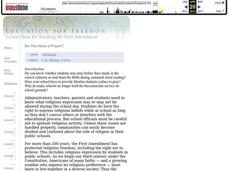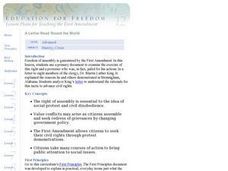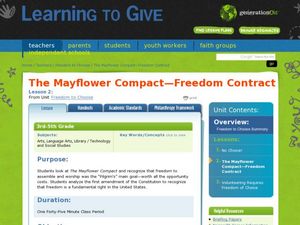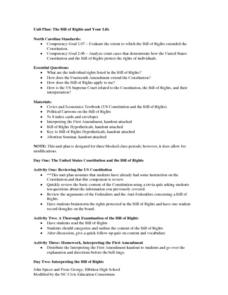Curated OER
Religion in the Schools
The requirements of the Equal Access Act are studied and applied to factual situations. By looking at the particular contexts suggested your class can examine the difficulties faced by administrators in whether they should permit...
Administrative Office of the US Courts
Texas v. Johnson
Which right does the Constitution weigh more heavily: the sanctity of the American flag as a symbol of national unity, or the right to burn the flag in protest? The 1989 Supreme Court case of Texas v. Johnson explores a...
State Bar of Texas
Texas v. Johnson
If you saw a person burning an American flag, how would you feel? Scholars analyze the concept of freedom of expression and speech with the Supreme Court case Texas v. Johnson. A short video clip creates open discussion in pairs on the...
Curated OER
Court Cases Testing the Establishment of Religion
Although the PowerPoint this lesson plan calls for is unavailable, you could easily create a presentation to fulfill its purpose. Learners listen to a presentation and keep track of the information with a graphic organizer that looks at...
Curated OER
Supreme court Decisions on Freedom of Religion
Eleventh graders analyze the limits and bounds of religious freedom issues in the United States through several Supreme Court case decisions.
Curated OER
Do You Have a Prayer?
Students review the 1st Amendment and the clauses which deal with prayer/religion in schools. They discuss, in groups, the Equal Access Act, which gives students the right to practice/express their religion at school and take a quiz on...
Curated OER
The Bill of Rights is for US Today
The first ten Amendments of the U.S. Constitution are vital for young people to understand. Provide the foundation of the laws that govern our country with this junior high school lesson. Groups use the newspaper to identify rights...
Curated OER
The Constitution and the Right to Vote: Ch 6
The US Constitution dictates which members of society have the right to vote. After reading about amendments extending voting rights, your class answers these questions on the 15th, 14th, and 23rd amendments. Use as a quiz or to guide...
Tennessee State Museum
An Emancipation Proclamation Map Lesson
Did the Emancipation Proclamation free all slaves during the Civil War? Why was it written, and what were its immediate and long-term effects? After reading primary source materials, constructing political maps representing information...
Curated OER
Simplified United States Constitution and Bill of Rights
A good handout is a great find. Print this resource and hand out a simplified version of the US Constitution and Bill of Rights to your US government or US history class. The powers of the president, Congress, and the Senate are...
Project Tahoe
Does the Use of Torture on Enemy Combatants Violate the 8th Amendment?
Tackle ethics in your high school history classes with a Socratic seminar about torture as a means for obtaining information. The plan allows for pupils to take the reins during the seminar. On the first day, class members read several...
Curated OER
The First Amendment
Students participate in a mock trial. Given the scenario, students prepare a cases concerning the freedom of religion, freedom of speech, and the right to assemble. In groups, students prepare an opening and closing statement, as well...
Curated OER
Free To Speak And Free To Post?
Students research online and in books city statutes regarding posting signs on utility poles, interview appropriate officials about ordinances and how completely it is enforced, explore what has happened elsewhere when citizens decided...
Curated OER
First Grade Visits...Washington DC
Take your first graders on a virtual trip to around Washington, DC. This presentation provides illustrated slides featuring a map showing the location of Washington, DC, the White House, and some of the more famous memorials and...
Curated OER
A Letter Read 'Round the World
Young scholars examine primary document to examine the concept of free assembly, and analyze Dr. Martin Luther King Jr's letter to the clergy to explain the rationale for this tactic to advance civil rights.
Curated OER
In God We Trust; All Others Pay Cash
Learners review their knowledge on the First Amendment. After reading an article, they identify specific church and state issues. Using the Internet, they research President Bush's proposal from a specific point of view. They summarize...
Curated OER
The Mayflower Compact: Freedom Contract
Students read historical documents. In this freedom lesson, students discuss the freedoms they have, such as whom to play with at recess, and how the pilgrims must have felt when they landed in America. Students read The Mayflower...
Judicial Learning Center
Do You Know Your Bill of Rights?
The Bill of Rights is much more than an important piece of paper! The rights cover everything from freedom of speech to the right to remain silent if arrested. Scholars find out their own rights by answering the questions in the form of...
Curated OER
Express Yourself Lesson Seed 18: Investigate
Prepare your class for argumentative writing with a close inspection of the controversy surrounding Theodore Taylor's novel, The Cay. All necessary articles and materials are linked at the beginning of the resource. Kids use the provided...
Curated OER
The Bill of Rights and Your Life
High schoolers review the contents of the Constitution by taking a trivia quiz and brainstorm the rights contained in the Bill of Rights. After discussing the Bill of Rights, students categorize and outline its content. Given a...
Curated OER
The Bill of Rights: Debating the Amendments
Students interpret historical evidence presented in primary and secondary resources. In this Bill of Rights lesson plan, students research 12 possible amendments that were considered for the Constitution in 1789....
Curated OER
Just Say It
Students explore the initial Supreme Court decision to regulate commercial speech, and then analyze the legal precedents and principles underlying a recent case contesting this regulation.
Curated OER
Amending the Constitution
Students research the history of the process of amending the US Constitution to explain the latest amendment that failed on June 28, 2006. They complete the research and view images online.
Curated OER
Constitutional Convention Simulation
Why did the Founders make it so challenging to amend the US Constitution? To gain an understanding of why the process is so difficult, class members engage in a Constitutional Convention simulation. Groups draft, propose, and debate...

























